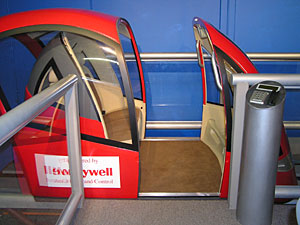Photos
Your Voice
| ||||||||||||||||||||||||||||||||||||||||||||||||
Personal rapid transit spending draws fire at Capitol
April 23, 2004
 |
| A personal rapid transit vehicle at the Taxi 2000 facility in Fridley. (MPR Photo/Laura McCallum) |
St. Paul, Minn. — Supporters of personal rapid transit say it's the next best thing to driving your own car. Under the prototype developed by Fridley-based Taxi 2000, you'd go to a PRT station and swipe a prepaid fare card through a machine similar to an ATM. Punch your destination into a keypad, and get in a PRT car that holds three or four passengers.
"The seats come up, and now you have room for a wheelchair and an attendant. We have two screens in the car - this screen is used to confirm your destination and give you an estimated time of arrival," says Taxi 2000's president, Mike Lester.
Push the go button, and the car takes off.
It's a quiet ride on the 60-foot demonstration track. The cars run on tracks that would stand on 16-foot pillars, so passengers could travel over pedestrians and along freeways. One of PRT's biggest supporters at the Capitol is
Rep. Mark Olson, R-Big Lake, has strongly opposed light rail and commuter rail, but he likes personal rapid transit.
"It is the only fully automated, fully mass produceable, individualized, nonstop, to your destination, 24 hours a day, 7 days a week, public transit system of its kind in the world," he says.
Olson was able to get $4 million for PRT in the House bill that would authorize state borrowing for construction projects. The money in the so-called bonding bill would go toward a $24 million building to test the concept.
Rep. Frank Hornstein, DFL-Minneapolis, says he was surprised to see PRT money in the bill. "I think part of the problem with this is that it has not received a lot of public scrutiny."
Hornstein says no Minnesota city has asked the Legislature for funding for PRT, and he says it's an unproven technology.
"Where it has really seriously been studied -- and that is in Cincinnati, Ohio and Rosemount, Illinois -- thorough studies done by credible public agencies, they've simply said that this is not viable," Hornstein says.
PRT has been successfully used in Morgantown, W.V., a college town that uses personal rapid transit vehicles to shuttle people between three campuses. And while no Minnesota city is demanding personal rapid transit, supporters in Minneapolis and Duluth think the two cities would be good demonstration projects.
Supporters range from Minneapolis City Council member Dean Zimmerman, a Green Party member, to Republican Sen. Michelle Bachmann of Stillwater. Bachmann says personal rapid transit, like many political issues, creates strange bedfellows.
"People on the right, people on the left, we have the common goal of moving people with transit, but doing it in the most cost-effective manner, in fact, in a manner that may end up costing no government subsidy, it may end up paying for itself," she says.
Taxi 2000 says PRT could be paid for by fares and private investors. President Mike Lester says it would cost about $12 million a mile to build, compared to about $70 million a mile for light rail. Skeptics say the proposal is too risky. And at a time of fierce competition for state bonding money, PRT is not a top transportation priority for most lawmakers.
The chair of the Senate Transportation Committee, DFLer Steve Murphy of Red Wing, gives it half-hearted support.
"We want transportation systems that work. And if this is one way that we can help move more people more expeditiously, then we're willing to take a look at that. We've heard some of these proposals in the past in the Senate, and the big stick-up is, it costs a lot of money," Murphy says.
Murphy says he's much more interested in other transit projects, such as the proposed Northstar commuter rail line between Minneapolis and Big Lake. Murphy says it's unlikely the Senate will include personal rapid transit in its bonding bill. It was not in the governor's bonding proposal either. It may be a long shot for state seed money, but that hasn't deterred PRT supporters, who believe Minnesota should be the testing ground for PRT.
|
News Headlines
|
Related Subjects
|

